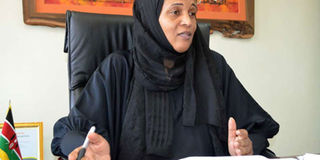Mombasa picks two firms to desalinate ocean water

Mombasa Water executive Fatma Awale. PHOTO | FILE | NATION MEDIA GROUP
What you need to know:
- Plants expected to produce at least 130,000 cubic metres of water daily.
- Mombasa traders supplying dirty water warned of prosecutions.
A Spanish and a Swiss company have been awarded a multi billion-shilling tender to desalinate sea water in Mombasa.
Water executive Fatma Awale said desalination would begin in June.
“Some 10 companies were eyeing the tender but we settled on the two,” Ms Awale said.
The executive, who did not reveal the cost of the project, said the plants would be producing at least 130,000 cubic metres of fresh water daily.
One plant will be in north mainland (Nyali or Kisauni) and the other in the south (Likoni).
On March 8, Water Cabinet Secretary Simon Chelugui told the Nation that the government abandoned desalination plans for Mombasa due to high costs.
“Last year, Coast Water Development Authority advertised tenders for these kind of works. They wanted to desalinate sea water as it is done in Israel and other countries," he said.
"Before we desalinate sea water, we have to explore economical, efficient and more portable sources and supplies.”
CHALLENGES
Mr Chelugui, who spoke during the first Kenya National Dam conference at Flamingo Beach Resort in Mombasa, said the country's tourism hub was facing water crisis and that in three years, it would face similar challenges like Cape Town in South Africa due to climate change.
Ms Awale said Mombasa needed more than 180,000 cubic metres of water every day, but it only received 43,000 from Baricho Dam in Kilifi County.
“It is not enough,” she said.
“Bowsers are supposed to assist in supplying water to hospitals and other essential areas. We take water to Coast General and Port Reitz hospitals to reduce the shortage.”
UNSAFE WATER
The executive said the acute water shortage in Jomvu was due to disconnection of illegal pipes.
“But the area is getting water two times a week. Mazeras and Nyali Bridge are designated areas for genuine water bowsers. We will deal with water cartels,” she said.
The executive said traders supplying unsafe borehole would be prosecuted.
“They are getting their water from boreholes. Residents might contract cholera and other diseases if traders are not regulated,” Ms Awale said.
MEETING
She added that the county would register water bowser companies and honey suckers.
Ms Awale said the bowsers must meet the county sanitation requirements.
Mombasa County officials and traders will meet on March 27 to deliberate on water management.





